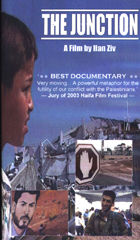
The Junction 2003
Distributed by First Run/Icarus Films, 32 Court St., 21st Floor, Brooklyn, NY 11201; 800-876-1710
Produced by Ilan Ziv
Directed by Ilan Ziv
VHS, color, 52 min.
Sr. High - Adult
Jewish Studies, Middle Eastern Studies
Date Entered: 02/11/2005
Reviewed by Ethan Pullman, Reference and Instruction Librarian, Hillman Library, University Library System, University of PittsburghThis powerful documentary tells how soldiers and families on both sides of a Palestinian/Israeli conflict were impacted by violent events surrounding a conflict at a crossroads in Gaza that was chosen as the site of Netzarim, a Jewish settlement, near Nusseirat, a Palestinian refugee camp. This conflict resulted in the loss of two lives: Fahmi Abou Ammouneh, a Palestinian, and later David Biri, a Jewish Soldier. Abou Ammouneh had decided to participate in riots following Sharon’s visit to the Dome of Rock, which is also claimed to be the site of the Temple mount, a holy place for Jews. The Israeli military that guarded the settlement became the object of the riots due to its proximity to Nusseirat. Israeli helicopters fired at the site of the riot and succeeded in breaking up the assault, killing Fahmi in the process. Later, a Palestinian roadside bomb killed David Biri, an Israeli solider, who was escorting civilians to Netzarim. In retaliation, the Israeli military razed the homes and orange groves of Nusseirat. What exactly led to these events is a topic of debate for those involved - a few religious fanatics who use their history and religion to point fingers and justify their actions fuel both sides. What is clear is that two lives were lost defending ideologies that were forced upon them by circumstance.
One might argue that many “facts” are missing from this documentary. But the viewer must keep in mind that it is not the director’s intention to provide a documentary of the Palestine/Israeli conflict, this has been sufficiently covered elsewhere. Ilan Ziv clearly chooses an inventive approach. He focuses on documenting the perspective of the people who are on the front lines of this conflict, not the politicians who draw up the plans and issue policy. This is evident in the brilliant direction and editing of Ilan Ziv, as he intentionally skips back and forth through the sequence of events, focusing his footage on input from families of both victims. Such scenes are symbolic evidence of the confusion and emotional charge that these families experience. When a reporter asks Abou Ammouneh’s sister about the losses that Jews experience, it is clear that she is stunned. “I don’t know”, she confesses. She adds, resigning with a tear rolling down her face, “Children all over die”. She’s accepted death as her inescapable reality from a seemingly inescapable occupation. Biri’s father knows this resignation all too well. Yes, he thought things would be different after Oslo, but he too couldn’t stop his child from making a decision to defend an occupying settlement endorsed by his own government. Both of the youths are victims of a political conflict controlled by neither. Mr. Ziv succeeds at demonstrating the insanity of this conflict and the price that both sides eventually pay, however unfair and unequal.
In terms of quality, the film is high in its production quality, editing, and sound. It should be used as means to challenge viewers to look deeper than the political surface in search of the true price of conflict. This film is a great teaching tool and would be useful in eliciting deeper understanding of the Palestinian/Israel conflict. Recommended for high school seniors and beyond as well as the general public who are interested in challenging preconceived notions on the Palestine/Israel issue.
Awards
- Best Documentary, 2003 Haifa Film Festival